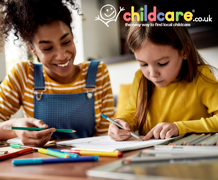Ways to Spot if Your Child May Have a Learning Difficulty
Our Special Educational Needs Early Childhood Director, Natalie, looks at some of the key struggles that might indicate a child has a learning difficulty, such as Dyslexia, and how to help

What is Dyslexia?
Dyslexia is part of a wider group of conditions referred to as specific learning difficulties (SpLD). It is a learning difficulty that affects one or more area of reading, spelling and written language, and can hinder the development of written language, sometimes also affecting a child's oral language. Dyslexic children also often struggle with auditory or visual perception, sequencing and/or motor skills.
Your child may struggle with the following if they have a SpLD:
Please note: It is important to remember many children may display the following attributes and/or make these mistakes. You may need to consider a SpLD if the struggles are being displayed at home, nursery or school and are persistent over time.
- Difficulty learning rhymes or reciting the alphabet
- Takes longer to develop speech
- Muddles words and substitutes words
- Finds it difficult to carry out two or more instructions
- Forgetful
- Confusion between direction, for example, up and down
- Difficulty with routines
- Struggles to follow shapes with a pencil
- Appears to not listen
- Family history of SpLD
- Poor coordination
How can I help my child?
It's often a process of elimination but it's a good idea to start with hearing or sight tests to ensure these are not hindering your child's development.
Speech and language assessments are useful too. Research shows that speech and language difficulties predict later delays in literacy, so the earlier difficulties are addressed, the better the outcome for the child.
A formal diagnosis can be undertaken by a Dyslexia specialist assessor, educational psychologist or occupational therapist, who are also able to diagnose SpLD. Assessments, especially for Dyslexia, are often carried out from around 7 years old.
Is my nursery/school able to help with specific learning difficulties?
Specialist practitioners in our nurseries will support any child that may be displaying these characteristics, and this support is then in place ready for school teachers to take over. Don't worry about having to get a formal diagnosis, practitioners and teachers will identify and support each individual child's needs, making sure they receive the help they need.
Once diagnosed, a child with Dyslexia, or with specific learning difficulties, will be placed on the SEND register so they can be assisted though a support plan, which parents should be involved in. This coordinated support sets out how the nursery or school will support your child to have equal opportunities and make progress individual to them.
What does this mean for my child's future?
Dyslexia is not related to a child's intelligence or ability and, with the right support in place at home and at nursery or school, doesn't need to hold children back. A child with Dyslexia may need repetition and time to process the information being taught.
Additional resources, such as coloured overlays to support reading or talk to text software may support them in the classroom.
Many successful scientists, artist, and educators have Dyslexia - have a google you will be surprised! Even the person writing this blog has Dyslexia!
Useful Resources:
- Nessy - Reading, Writing And Spelling Help For Children With Dyslexia
- Parenting a Dyslexic Child - Drawing on the expert knowledge and research gathered by the British Dyslexia Association, this is a complete guide to parenting a child with dyslexia.
- Child Mind Institute - Understanding Dyslexia and How to Help Kids Who Have It
- Understood - A Day in the Life of a Child With Dyslexia
- British Dyslexia Association - Signs of Dyslexia (Early Years)
- NHS - Dyslexia symptoms

School Holiday Cover
Be prepared for the next school holiday
Ideal for filling those awkward care gaps during the school holidays, we provide easy access to holiday clubs nationwide.
Find out more











